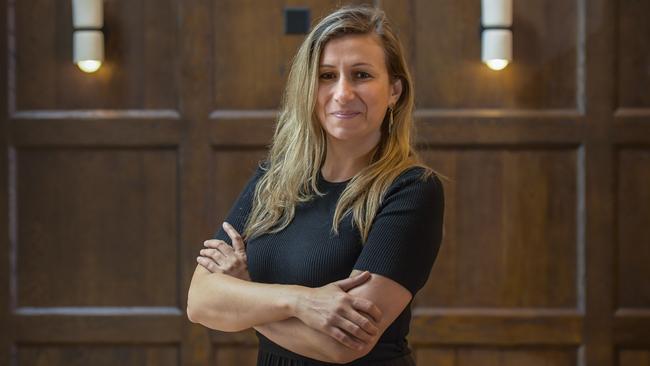One of BHP’s top execs Laura Tyler says nuclear power should be ‘in the mix’ for Australia’s energy needs
There is a ‘shoot from the hip’ response to nuclear energy in Australia, but if you want reliable baseload power without fossil fuels, it must be ‘in the mix’, a top BHP exec says.

Business
Don't miss out on the headlines from Business. Followed categories will be added to My News.
BHP executive Laura Tyler says nuclear energy “has to be a part of the conversation’’, describing the dismissal of the controversial energy source as a “very shoot from the hip” approach.
Ms Tyler, BHP’s chief technical officer, said she would like to see uranium as part of the energy supply solution in Australia, but acknowledged that we were still “having the conversation’’ at a political level.
BHP’s Olympic Dam copper, gold and uranium mine in South Australia is the world’s largest single deposit of the nuclear fuel, but with Australia not having a nuclear energy industry the resource is exported overseas.

Speaking at The Australian’s Strategic Business Forum in Adelaide on Thursday, Ms Tyler said countries should look to their natural advantages when it came to addressing the challenge of providing baseload power in a low emissions environment, which in some cases would mean renewables such as solar.
But she said uranium should not be discounted as a baseload power source for the nation.
“I would like to think that Australia could consider it as part of the whole,’’ she told the forum.
“When you think about where we will see reliable baseload, if you don’t have the storage … then you need the baseload, because you’ve got to keep hospitals and things running 24/7, you’ve got to be able to keep big business running 24/7.
“If you’re not prepared to do oil and gas or coal, then what is it going to be based on?
“There’s a very shoot from the hip response to uranium, because it’s difficult to manage, it’s not as simple as maybe oil and gas but at the same time … its consequences can be big,” Ms Tyler said.
“If you look at the consequence of failure, that’s how people think about it, without seeing how we manage it effectively in such as stable country as Australia.
“I would like to see it in the mix, but at this point we’re still having the conversation.’’

The global energy crisis, triggered by the war in Ukraine, has sent prices for thermal coal and gas surging, and along with gas shortages and increasing electricity prices forecast for the east coast, has sparked a renewed debate about the merits of Australia going nuclear for its energy needs.
Energy Minister Chris Bowen has dismissed as foolish the Coalition’s renewed push for a nuclear energy industry, with the government backing wide-scale renewables and storage instead.
The scale of the challenge was thrown into sharp relief with the release of the budget this week with a forecast 56 per cent increase in electricity prices over the next two years throwing Labor’s pre-election pledge to cut household electricity bills by $275 by 2025 into grave doubt.

Raymond Spencer, chair of renewables company Zen Energy, which counts Ross Garnaut, author of the 2008 Garnaut Climate Change Review among its investors, told the forum that Australia should avoid getting “sucked into government overintervention’’ in energy markets’’. “Political one-liners are not always the best vehicle for solving complex problems,’’ Mr Spencer said.
Commenting on a Victorian government plan to set up a state-controlled renewable energy company in a bid to push down power prices, Mr Spencer said the state would have to “tread very carefully about how it intervenes’’.
Mr Spencer said weakness in the Australian dollar meant the country was “ripe for investment'’ both for companies wanting to get into the renewables space but also to invest in operations and value-add with the benefit of cheap renewable energy.
Mr Spencer said the federal Renewable Energy Target should be extended from its current end date of 2030 to 2035, which would be a simple and efficient way to bolster investment.
Under the RET, entities, usually electricity retailers, are required to purchase and surrender to the Clean Energy Regulator a certain number of certificates each year, with the program incentivising investment in large and small-scale renewable energy.
Originally published as One of BHP’s top execs Laura Tyler says nuclear power should be ‘in the mix’ for Australia’s energy needs





